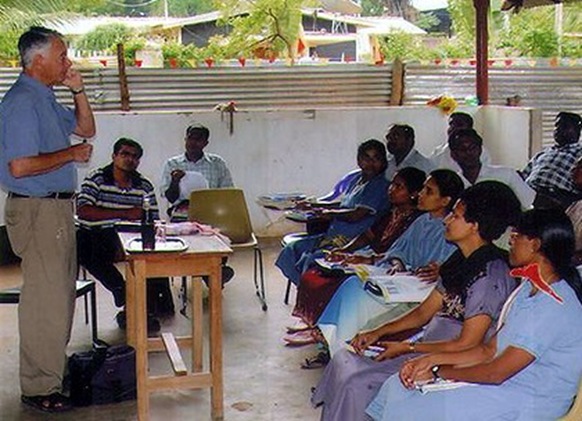 They’re freedom fighters, not terrorists, says Professor John Whitehall. Tim Elliott writes.
They’re freedom fighters, not terrorists, says Professor John Whitehall. Tim Elliott writes.
HE HAS been called a ”terrorist collaborator” and ”cunning propagandist”, a ”brainwashed puppet” and ”naive white man”. He has been investigated by the Australian Federal Police and was mentioned last year by a Supreme Court judge in relation to potential anti-terrorism charges. But for Professor John Whitehall, the University of Western Sydney’s foundation chair of paediatrics and child health, ”collaborating” with Sri Lanka’s Tamil Tigers is nothing to hide from.
”People called them terrorists,” Whitehall says. ”But as far as I could tell, they were freedom fighters. They were also my students, and I loved them.”
At least nine of those ”students” are now dead, killed in the final stages of the Sri Lankan civil war, in which the Tigers lost their fight against the government for a separate homeland in the island’s north and east. And although the war finished two years ago, for Whitehall, at least, the struggle has not stopped. The 68-year-old, who was a finalist for Senior Australian of the Year in 2006, has since championed the Tamil cause in human rights forums and the media, where he has pressured the Australian government to pursue war crimes allegations against the Sri Lankan leadership.
”The Sri Lankan army has a lot to answer for,” says Whitehall, who was buoyed by the release this week of a United Nations report that found credible allegations of war crimes committed by both sides.
”They bombed Tamil orphanages and schools and still have tens of thousands of Tamils locked up in secret concentration camps,” Whitehall says. ”It’s an ongoing tragedy and yet no one is held responsible.”
Whitehall first visited Sri Lanka in 2005 to deliver antibiotics and ventilators to areas devastated by the Asian tsunami. Later that year he returned, travelling to the north to teach what he thought was a group of medical students from Jaffna University. ”About three weeks later, however, I discovered that my students comprised the medical wing of the Tamil Tigers.” Most of his students had been fighters: many had suffered bullet and shrapnel wounds, three had wooden legs. They were familiar with combat medicine – everything from how to treat mass casualties to arterial surgery by torchlight while under artillery attack. To complete their medical degrees, they required a paediatrics course, and Whitehall obliged.
”When two fellows from the AFP interviewed me later on … I just told them I was teaching the Tigers how to look after sick children. That’s what I do.”
Whitehall spent three months with the Tigers, during which time he befriended their political leader, S. P. Thamilchelvan (”a reasonable man, intelligent, engaging, educated”), visited their jungle hospitals and even helped his students publish a book of their first-hand accounts of the conflict, called War and Medicine.
His work has earned him the ire of the Sinhalese community in Australia and Sri Lanka. ”The Ceylon College of Physicians wrote to the Australia College of Physicians asking that I be struck off,” Whitehall says. ”I was actually quite proud of that.”
Nimal Liyanage, a spokesman for an Australian Sinhalese group called SPUR (Society for Peace, Unity and Human Rights for Sri Lanka), says Whitehall is ”naive” and ”ignorant”.
”He gave medical assistance to a group that were at the same time sending suicide bombers to Colombo,” Liyanage says. ”[Whitehall] has a concern for human suffering, but why was he so blind to the carnage that went on in buses, trains, shopping malls, banks, streets and isolated villages for over 30 years done by the Tigers?”
He says Whitehall was a ”willing accomplice”; he has ”been indoctrinated with this stuff of the ‘good terrorist’. He willingly accepted the idea that this terrorism was for a good cause, so the bloodshed of 20 million Sri Lankans by a few thousand Tigers was OK for him.”
Whitehall continues to seek what he regards as justice for the Tamils, but remains pessimistic about the UN report.
”The UN is ineffective, but Australia should do something on its own, like revoke [Sri Lankan President Mahinda] Rajapaksa’s invitation to the Commonwealth Heads of Government Meeting in Perth in October.
(For updates you can share with your friends, follow TNN on Facebook and Twitter )
